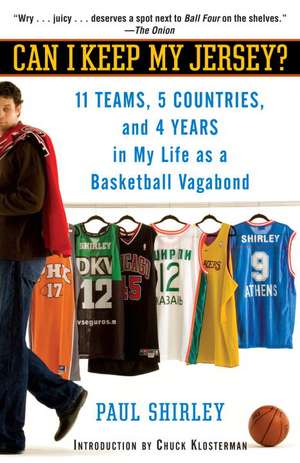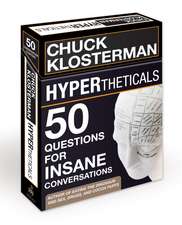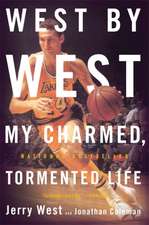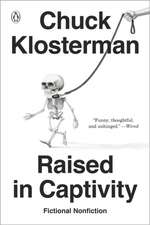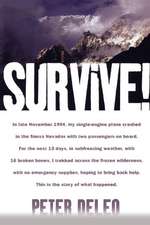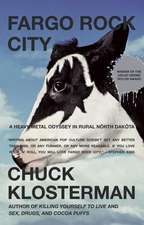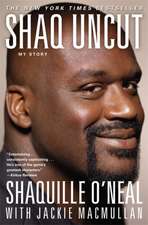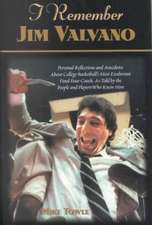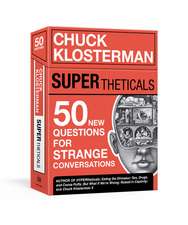Can I Keep My Jersey?: 11 Teams, 5 Countries, and 4 Years in My Life as a Basketball Vagabond
Autor Paul Shirley Chuck Klostermanen Limba Engleză Paperback – 29 feb 2008 – vârsta de la 14 până la 18 ani
There’s no denying that Paul Shirley is the closest thing pro basketball’s got to Odysseus. In Homeric fashion, he has logged time practically everywhere in the roundball universe, from six NBA cities to pro leagues in Spain and Greece to North America’s pro ball Siberia, the minor leagues. Hell, he’s even played in the real Siberia. And in Can I Keep My Jersey?, Shirley finally puts down roots long enough to deliver one of the great locker-room chronicles of the modern age.
With sharp elbows and an even sharper wit, Shirley–whose writings have been described as “wildly entertaining” by The Wall Street Journal–drops hilarious commentary, revealing which teams have the best cheerleaders (he’s spent many a time-out watching them ply their trade), why Christ is rapidly becoming every team’s “sixth man,” and even the best ways to get bloodstains out of your game uniform, using only an ordinary bar of soap and a hotel bathroom sink.
From sharing the court with Kobe and Shaq to perusing the food court at some mall in a bush-league burg; from taking pregame layups to getting laid out by a stray knee from an NBA power forward; from hopping a limo to the team’s charter jet to dashing to catch the van home from a B-league game in Tijuana, Shirley dishes on what it’s like to try to make it as a professional athlete. Can I Keep My Jersey? is a rollicking, thoughtful, even thought-provoking insider’s look at a pro baller’s life on the fringe. Like Jim Bouton’s Ball Four or John Feinstein’s A Season on the Brink, Shirley’s odyssey deserves to find a home on every sports fan’s bookshelf.
From the Hardcover edition.
Preț: 112.33 lei
Nou
Puncte Express: 168
Preț estimativ în valută:
21.49€ • 22.50$ • 17.79£
21.49€ • 22.50$ • 17.79£
Carte disponibilă
Livrare economică 17-31 martie
Preluare comenzi: 021 569.72.76
Specificații
ISBN-13: 9780345495709
ISBN-10: 0345495705
Pagini: 336
Dimensiuni: 134 x 202 x 19 mm
Greutate: 0.25 kg
Ediția:Reprint
Editura: Villard Books
ISBN-10: 0345495705
Pagini: 336
Dimensiuni: 134 x 202 x 19 mm
Greutate: 0.25 kg
Ediția:Reprint
Editura: Villard Books
Notă biografică
Paul Shirley has played for eleven professional basketball teams in the six years since he graduated from Iowa State University, where he was an engineering major and an academic All-American. While with the Phoenix Suns in 2005, he blogged about his experiences with the team on NBA.com. When not trying to catch on with yet another pro club, Shirley authors a column for ESPN.com called “My So-Called Career,” and he has even co-written and produced a television pilot based on his life in basketball.
From the Hardcover edition.
From the Hardcover edition.
Extras
September 15
My home here in Atlanta is a hotel connected to the CNN Center—the epicenter of the world of cable television. As such, one would think that I have a plethora of televisionary options to fill my non- basketballing time. Not so. I think I have two channels that are not somehow related to CNN. And I doubt that either of them is going to show the Kansas City Chiefs game that I am fixated on watching, if only because it would breathe some normalcy into my current existence.
I’m here trying to make the Atlanta Hawks. My days are filled with basketball workouts, obsession about the repercussions of those workouts, and avoidance of the out-of-doors—strangely, it’s really hot in the South. My chances of success in this endeavor weren’t great to start with. (Chances of making the team, that is. I’m pretty good at staying inside.) However, I’d feel better about my odds of making the team if I had the use of all of my digits.
I should explain.
My brother Dan volunteered (was coerced) to take me to the Kansas City airport. As I robustly tossed my duffel bag into the trunk of his teal Grand Am, an as-yet-unidentified metal protrusion in that trunk nearly tore off the top of my right index finger. I said, “Darn it,” and went back inside to patch myself up before he drove me to the airport. Obviously, worse events could have befallen me—a car accident, a tornado, or a raging case of syphilis each would have caused me far more strife. Nonetheless, I could have done without an additional hurdle in an already uphill climb.
My seemingly insignificant injury resulted in a condition wherein I now occasionally have no idea where a basketball will go when it leaves my hand. Which would have been fine had I not been bound for an NBA training camp. (Additionally, I am struggling to type the letters Y, U, H, J, N, and M. So perhaps I should amend the previous statement—stenographer’s boot camp would have been a challenge as well.)
Most players in the NBA do not fight for their jobs each year. Generally, they have guaranteed contracts—often for multiple years. For one of those players, training camp is merely the season’s beginning. That player endures the twice-daily practices safe in the knowledge that he will be on the team for the entire year. Because the team has already committed to paying him a salary for the season, it would make no sense to release him. I have never been the player in the example.
Most teams maintain one or two open roster spots and allow players like me, who will jump at the chance to make an NBA team, to fight among like-minded souls for the remaining slots. (Note: it is not an actual fight . . . although that would make camp more interesting. I envision gladiator-style arena battles for the final roster spot, audience participation, a vote at the end . . . it could work.) The team guarantees the combatants nothing more than a per diem and a fair shot. It is debatable how fair that shot really is, but at least the per diem isn’t bad—$95.
The difficulty in wrangling even an unpaid NBA training camp invitation amazes me. Last year—my rookie season—I had to fly to Los Angeles for a two-day tryout with the Lakers before they would commit exactly zero dollars for my training camp services. This year, I needed to impress the Atlanta Hawks coaches in yet another tryout setting. To this end, I went early in the fall to a two-day workout with the Hawks in order to fight for a position as low man on the proverbial totem pole. While I was there I played well enough that the team invited me to training camp, starting October 1.
Camp with the Hawks will be populated by several players in a like situation—guaranteed nothing and hoping to remain on the team through the madness that is two-a-days, preseason games and practices that seem—and might be—make-or-break. If I manage to survive the laid-back atmosphere and find a roster spot on the Atlanta Hawks when the first game of the actual season finally arrives, I will have accomplished the most outlandish goal I’ve ever had—to play in the NBA. Not that I’m taking this too seriously or anything.
I spent the summer loosely affiliated with the Cleveland Cavaliers. Again. The NBA holds a brief summer league each year. Although summer league teams play under the banner of NBA teams, only a few of the players on each squad wind up playing for the team in the winter. The summer league is a chance for a team’s personnel to get an early look at players they drafted, young players who may be in line for a longer contract, and jackasses like me who are hoping that someone watching might take a liking to what they see. I played quite well in the NBA’s summer league in Salt Lake City, but Cleveland wasn’t interested in paying me to play for them during the season. (Such is my assumption, anyway; I think I would have noticed the six-year contract if it had arrived in the mail.) I surprised the Cavaliers’ coaching staff by keeping pace with one of the team’s new toys—their first-round draft pick, Carlos Boozer, of Duke fame. As I displayed my basketball wares alongside fellow free agents, rookies, and near-rookies, it was apparent that I belonged on the court. But the team drafted Boozer and so has a vested interest in his future success. Consequently, he returned to Cleveland safe in the knowledge that he had a shiny two-year contract that would pay him roughly $1 million. I returned to Meriden, Kansas, safe in the knowledge that I had a lopsided bed in my parents’ basement and access to my old high school gym from ten to eleven every morning. I played far better this summer than last but—as seems to be the trend in my life—had nothing more to show for it.
When I went to training camp with the Lakers last year, I thought there was a 5 percent chance that I would make the team—odds similar to the survival rate after a diagnosis of pancreatic cancer. This year with the Hawks, that probability has improved to 20 percent. (Lymphoma.) Neither number is sufficient to warrant heavy action in Las Vegas, but it is encouraging that the trend is not the opposite one. (Source: my own warped view. I have no evidence to back up my statistical claims.)
After passing my late August audition with Atlanta, I returned to Kansas and continued the workout routine that I had embraced for most of the summer so that I would be prepared for training camp. The Hawks offered to let me join the team’s pre-preseason training sessions anytime after Labor Day. I would have rather stayed in the warm uterus of the heartland, but the Hawks’ offer was not one to be spurned by an unguaranteed free agent who has never played in the NBA. To that end, I packed and prepared for an indeterminate amount of time in Atlanta.
I spent my first two days here in Atlanta participating in a mini-camp with the Hawks. The NBA recently decided to allow such events sporadically throughout the summer and fall so that each team can get together for extra work and/or confirm that none of its respective players has been recently incarcerated. Since my mini-camp experiences with the Hawks, my time has been consumed by individual workouts and pickup games while we prepare for the beginning of training camp in two weeks.
Mini-camp consisted of laid-back practices where, according to NBA rules, the drills could not go beyond three-on-three. So the two days ostensibly were not too difficult. However, it always re-surprises me that such a high level of concentration is required if one wants to have any success at the NBA level. The slightest wandering of the mind—especially when one is trying to learn a basketball system or philosophy from scratch—makes catching up a challenge. Over the years, I have come to understand that there are two intelligence-level options among basketball players: (1) A player can be relatively intelligent, and so can concentrate for long periods of time, or (2) he can be a Neanderthal. In the latter case, a coherent thought rarely sails through the participant’s brain. The relative emptiness inside that player’s cranium makes it easy to focus on simple activities. For example, when one has no other worries, the instruction “Put ball in basket” becomes a fairly easy command to follow. The rest of us are balancing the need to call about health insurance, concerns about our dinner plans, and confusion about our purpose on this earth. Meanwhile, the moron already scored and is pointing to the sky on his way back down the court.
Surprisingly, many NBA players fall into the former category—the smart-guy group. I make note of the unrecognized good fortune of the idiot only because I am envious. Such ease of focus has been demonstrated to me by many former teammates; it proves maddening for me to admit that it is so effective. The proverbial blank canvas, perhaps. For better or worse, I fall more easily into the category of the relatively intelligent soul. Thus my need for extreme concentration at all times, if only to dumb myself down. What a waste of brain cells.
September 22
Late this week I signed a contract with the Hawks, which sounds a lot better than it really is. As previously mentioned, my contract is valid only if I am on the team’s roster at the end of training camp. I will admit that it is somewhat intoxicating to sign my name to a contract that states that I will receive $512,435—the minimum yearly salary for a player with my experience. Because I went to training camp with the Lakers last season, I am no longer considered a first-year player—even though I was not on an NBA team during the regular season. The NBA regulates minimum salaries according to years of service. (Which makes it sound like the army. Life in the NBA is decidedly dissimilar to life in the armed forces.) I now qualify as having had one year of that service, so my salary escalates according to a preset scale. Unfortunately, that financial boon isn’t quite the benefit it would seem to be at first blush. While my potential personal financial gain does increase, the team is required to pay me more than a player who has never been to a training camp, so the system could work against me. I wanted to offer the Hawks some sort of Kevin McHale/Joe Smith arrangement whereby I would return some of the money if those in charge would allow me a spot on the team. But I chickened out. I still do threaten to someday go to the GM’s office and give him my best PowerPoint presentation, entitled “Why Paul Shirley Should Be an Atlanta Hawk.” Some of my key bullet points would include:
•I will never be pulled from the charred remains of a Ferrari at 5 a.m.*
•I will never complain about playing time or my role on the team.**
•The importance of actually learning the plays is not lost on me.***
•I have no illegitimate children for whom I need complimentary tickets.****
I think it’s a foolproof plan.
I have been impressed with the work ethic of most of the Hawks. Perhaps the most impressive is displayed by Shareef Abdur-Rahim. As far as I can tell, he is almost always the first player at the gym and he appears to actually work hard. In real-world logic, this would seem appropriate—he is set to make $20 million this year. I have found, though, that basketball logic is usually the exact opposite of its real-world counterpart. Usually it goes that the more money a player makes, the less effort he puts forth. Shareef is a thoughtful guy; we have had a couple of decent conversations—probably more because his locker is right next to mine than anything else. It turns out that he was a collegiate teammate of Kenyon Jones, the other American on my team in Greece last year. In fact, now that I think about it, I believe Kenyon once told me that he owes Shareef some money but, in his words, “I don’t think he’s missing it.” Anyway, Shareef and I were relating college experiences recently. I have always maintained that mine was not exactly a normal collegiate existence, but I can hardly imagine what he thinks of his. He was at Cal for only his freshman year. In essence, since he probably did not stay around much longer than April because he was headed to NBA pre-draft camps and the like, his college experience lasted eight months. Because of his short stay in college, the man is all of one year older than me and is now entering his seventh NBA season.
(Side note: When talking to Shareef, most people call him “Reef.” I have a hard time latching onto nicknames, so I stick with “Shareef.” I contend that if I wasn’t around for the coining of the nickname, I am not allowed to use it. I think it is sound policy.)
* I will not, however, rule out a tragic Corsica accident.
** Until I sign a multiyear deal. Then, watch out.
*** To be honest, it is. If the ball comes my way, I’m shooting it.
**** See second footnote. The groupies won’t know what hit them.
From the Hardcover edition.
My home here in Atlanta is a hotel connected to the CNN Center—the epicenter of the world of cable television. As such, one would think that I have a plethora of televisionary options to fill my non- basketballing time. Not so. I think I have two channels that are not somehow related to CNN. And I doubt that either of them is going to show the Kansas City Chiefs game that I am fixated on watching, if only because it would breathe some normalcy into my current existence.
I’m here trying to make the Atlanta Hawks. My days are filled with basketball workouts, obsession about the repercussions of those workouts, and avoidance of the out-of-doors—strangely, it’s really hot in the South. My chances of success in this endeavor weren’t great to start with. (Chances of making the team, that is. I’m pretty good at staying inside.) However, I’d feel better about my odds of making the team if I had the use of all of my digits.
I should explain.
My brother Dan volunteered (was coerced) to take me to the Kansas City airport. As I robustly tossed my duffel bag into the trunk of his teal Grand Am, an as-yet-unidentified metal protrusion in that trunk nearly tore off the top of my right index finger. I said, “Darn it,” and went back inside to patch myself up before he drove me to the airport. Obviously, worse events could have befallen me—a car accident, a tornado, or a raging case of syphilis each would have caused me far more strife. Nonetheless, I could have done without an additional hurdle in an already uphill climb.
My seemingly insignificant injury resulted in a condition wherein I now occasionally have no idea where a basketball will go when it leaves my hand. Which would have been fine had I not been bound for an NBA training camp. (Additionally, I am struggling to type the letters Y, U, H, J, N, and M. So perhaps I should amend the previous statement—stenographer’s boot camp would have been a challenge as well.)
Most players in the NBA do not fight for their jobs each year. Generally, they have guaranteed contracts—often for multiple years. For one of those players, training camp is merely the season’s beginning. That player endures the twice-daily practices safe in the knowledge that he will be on the team for the entire year. Because the team has already committed to paying him a salary for the season, it would make no sense to release him. I have never been the player in the example.
Most teams maintain one or two open roster spots and allow players like me, who will jump at the chance to make an NBA team, to fight among like-minded souls for the remaining slots. (Note: it is not an actual fight . . . although that would make camp more interesting. I envision gladiator-style arena battles for the final roster spot, audience participation, a vote at the end . . . it could work.) The team guarantees the combatants nothing more than a per diem and a fair shot. It is debatable how fair that shot really is, but at least the per diem isn’t bad—$95.
The difficulty in wrangling even an unpaid NBA training camp invitation amazes me. Last year—my rookie season—I had to fly to Los Angeles for a two-day tryout with the Lakers before they would commit exactly zero dollars for my training camp services. This year, I needed to impress the Atlanta Hawks coaches in yet another tryout setting. To this end, I went early in the fall to a two-day workout with the Hawks in order to fight for a position as low man on the proverbial totem pole. While I was there I played well enough that the team invited me to training camp, starting October 1.
Camp with the Hawks will be populated by several players in a like situation—guaranteed nothing and hoping to remain on the team through the madness that is two-a-days, preseason games and practices that seem—and might be—make-or-break. If I manage to survive the laid-back atmosphere and find a roster spot on the Atlanta Hawks when the first game of the actual season finally arrives, I will have accomplished the most outlandish goal I’ve ever had—to play in the NBA. Not that I’m taking this too seriously or anything.
I spent the summer loosely affiliated with the Cleveland Cavaliers. Again. The NBA holds a brief summer league each year. Although summer league teams play under the banner of NBA teams, only a few of the players on each squad wind up playing for the team in the winter. The summer league is a chance for a team’s personnel to get an early look at players they drafted, young players who may be in line for a longer contract, and jackasses like me who are hoping that someone watching might take a liking to what they see. I played quite well in the NBA’s summer league in Salt Lake City, but Cleveland wasn’t interested in paying me to play for them during the season. (Such is my assumption, anyway; I think I would have noticed the six-year contract if it had arrived in the mail.) I surprised the Cavaliers’ coaching staff by keeping pace with one of the team’s new toys—their first-round draft pick, Carlos Boozer, of Duke fame. As I displayed my basketball wares alongside fellow free agents, rookies, and near-rookies, it was apparent that I belonged on the court. But the team drafted Boozer and so has a vested interest in his future success. Consequently, he returned to Cleveland safe in the knowledge that he had a shiny two-year contract that would pay him roughly $1 million. I returned to Meriden, Kansas, safe in the knowledge that I had a lopsided bed in my parents’ basement and access to my old high school gym from ten to eleven every morning. I played far better this summer than last but—as seems to be the trend in my life—had nothing more to show for it.
When I went to training camp with the Lakers last year, I thought there was a 5 percent chance that I would make the team—odds similar to the survival rate after a diagnosis of pancreatic cancer. This year with the Hawks, that probability has improved to 20 percent. (Lymphoma.) Neither number is sufficient to warrant heavy action in Las Vegas, but it is encouraging that the trend is not the opposite one. (Source: my own warped view. I have no evidence to back up my statistical claims.)
After passing my late August audition with Atlanta, I returned to Kansas and continued the workout routine that I had embraced for most of the summer so that I would be prepared for training camp. The Hawks offered to let me join the team’s pre-preseason training sessions anytime after Labor Day. I would have rather stayed in the warm uterus of the heartland, but the Hawks’ offer was not one to be spurned by an unguaranteed free agent who has never played in the NBA. To that end, I packed and prepared for an indeterminate amount of time in Atlanta.
I spent my first two days here in Atlanta participating in a mini-camp with the Hawks. The NBA recently decided to allow such events sporadically throughout the summer and fall so that each team can get together for extra work and/or confirm that none of its respective players has been recently incarcerated. Since my mini-camp experiences with the Hawks, my time has been consumed by individual workouts and pickup games while we prepare for the beginning of training camp in two weeks.
Mini-camp consisted of laid-back practices where, according to NBA rules, the drills could not go beyond three-on-three. So the two days ostensibly were not too difficult. However, it always re-surprises me that such a high level of concentration is required if one wants to have any success at the NBA level. The slightest wandering of the mind—especially when one is trying to learn a basketball system or philosophy from scratch—makes catching up a challenge. Over the years, I have come to understand that there are two intelligence-level options among basketball players: (1) A player can be relatively intelligent, and so can concentrate for long periods of time, or (2) he can be a Neanderthal. In the latter case, a coherent thought rarely sails through the participant’s brain. The relative emptiness inside that player’s cranium makes it easy to focus on simple activities. For example, when one has no other worries, the instruction “Put ball in basket” becomes a fairly easy command to follow. The rest of us are balancing the need to call about health insurance, concerns about our dinner plans, and confusion about our purpose on this earth. Meanwhile, the moron already scored and is pointing to the sky on his way back down the court.
Surprisingly, many NBA players fall into the former category—the smart-guy group. I make note of the unrecognized good fortune of the idiot only because I am envious. Such ease of focus has been demonstrated to me by many former teammates; it proves maddening for me to admit that it is so effective. The proverbial blank canvas, perhaps. For better or worse, I fall more easily into the category of the relatively intelligent soul. Thus my need for extreme concentration at all times, if only to dumb myself down. What a waste of brain cells.
September 22
Late this week I signed a contract with the Hawks, which sounds a lot better than it really is. As previously mentioned, my contract is valid only if I am on the team’s roster at the end of training camp. I will admit that it is somewhat intoxicating to sign my name to a contract that states that I will receive $512,435—the minimum yearly salary for a player with my experience. Because I went to training camp with the Lakers last season, I am no longer considered a first-year player—even though I was not on an NBA team during the regular season. The NBA regulates minimum salaries according to years of service. (Which makes it sound like the army. Life in the NBA is decidedly dissimilar to life in the armed forces.) I now qualify as having had one year of that service, so my salary escalates according to a preset scale. Unfortunately, that financial boon isn’t quite the benefit it would seem to be at first blush. While my potential personal financial gain does increase, the team is required to pay me more than a player who has never been to a training camp, so the system could work against me. I wanted to offer the Hawks some sort of Kevin McHale/Joe Smith arrangement whereby I would return some of the money if those in charge would allow me a spot on the team. But I chickened out. I still do threaten to someday go to the GM’s office and give him my best PowerPoint presentation, entitled “Why Paul Shirley Should Be an Atlanta Hawk.” Some of my key bullet points would include:
•I will never be pulled from the charred remains of a Ferrari at 5 a.m.*
•I will never complain about playing time or my role on the team.**
•The importance of actually learning the plays is not lost on me.***
•I have no illegitimate children for whom I need complimentary tickets.****
I think it’s a foolproof plan.
I have been impressed with the work ethic of most of the Hawks. Perhaps the most impressive is displayed by Shareef Abdur-Rahim. As far as I can tell, he is almost always the first player at the gym and he appears to actually work hard. In real-world logic, this would seem appropriate—he is set to make $20 million this year. I have found, though, that basketball logic is usually the exact opposite of its real-world counterpart. Usually it goes that the more money a player makes, the less effort he puts forth. Shareef is a thoughtful guy; we have had a couple of decent conversations—probably more because his locker is right next to mine than anything else. It turns out that he was a collegiate teammate of Kenyon Jones, the other American on my team in Greece last year. In fact, now that I think about it, I believe Kenyon once told me that he owes Shareef some money but, in his words, “I don’t think he’s missing it.” Anyway, Shareef and I were relating college experiences recently. I have always maintained that mine was not exactly a normal collegiate existence, but I can hardly imagine what he thinks of his. He was at Cal for only his freshman year. In essence, since he probably did not stay around much longer than April because he was headed to NBA pre-draft camps and the like, his college experience lasted eight months. Because of his short stay in college, the man is all of one year older than me and is now entering his seventh NBA season.
(Side note: When talking to Shareef, most people call him “Reef.” I have a hard time latching onto nicknames, so I stick with “Shareef.” I contend that if I wasn’t around for the coining of the nickname, I am not allowed to use it. I think it is sound policy.)
* I will not, however, rule out a tragic Corsica accident.
** Until I sign a multiyear deal. Then, watch out.
*** To be honest, it is. If the ball comes my way, I’m shooting it.
**** See second footnote. The groupies won’t know what hit them.
From the Hardcover edition.
Descriere
Offering an often hilarious, occasionally heart wrenching memoir of his life as a professional basketball player, Shirley details his years playing in America, Spain, and even Siberia.
